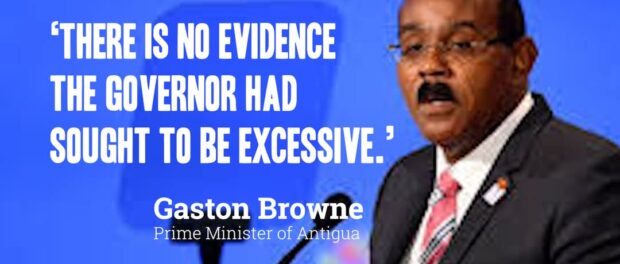GASTON BROWNE DEFENDS GOVERNOR TIMOTHY ANTOINE. MONETARY MAYHEM: GONSALVES VS. ECCB GOVERNOR IN $22M LUXURY RESIDENCE FIRESTORM!

ST JOHN’S, ANTIGUA (MARCH 9, 2025) – The Eastern Caribbean Monetary Union is ablaze with controversy as St. Vincent and the Grenadines Prime Minister Dr. Ralph Gonsalves wages war against Eastern Caribbean Central Bank (ECCB) Governor Timothy Antoine over a staggering EC$22 million residence project, fueling allegations of excess and mismanagement!
In a dramatic escalation of tensions, Antigua and Barbuda Prime Minister and current Chairman of the Eastern Caribbean Monetary Council Gaston Browne has come to Antoine’s defense, dismissing claims of corruption and calling for a closer examination of governance failures rather than personal blame.
GONSALVES’ BOMBSHELL ATTACK
The scandal erupted after a leaked letter from Gonsalves to Browne demanded Antoine’s termination, citing transparency concerns surrounding the high-priced residence. The call for Antoine’s head has sent shockwaves throughout the region, with many questioning whether this is a genuine fight for accountability or a calculated political move to block Antoine’s reappointment for a third term.
BROWNE BREAKS HIS SILENCE
Speaking on his radio show, Browne sought to quell the firestorm but admitted that the Monetary Council had been “caught flat-footed” by the ballooning costs of the project.
“There is no evidence that the Governor himself had sought to be excessive, and I don’t know that I have seen any case of corruption or something that will create an issue undermining the Governor’s integrity,” Browne stated firmly.
While acknowledging the need for stronger governance and oversight, Browne maintained that Antoine was not the villain in this high-stakes drama.
WHOSE RESPONSIBILITY IS IT?
As the region grapples with the controversy, seasoned regional broadcaster Julien Rogers has stepped into the fray, questioning the focus on Antoine rather than the broader governance processes that approved the expenditure.
“Blaming Antoine personally is misplaced,” Rogers argued in a recent commentary. “The ECCB does not operate at the whim of its Governor. Such an expenditure would have undergone board-level approvals, making it a collective decision rather than an individual one.”
Rogers went further, suggesting that Gonsalves’ crusade against Antoine may be politically motivated, aimed at ensuring the Governor does not secure a third term. “Given Gonsalves’s political weight within the ECCU, his opposition could shape the decision-making process when Antoine’s reappointment is discussed,” Rogers observed.
PALACE OR PRACTICALITY?
Defenders of the residence project argue that the EC$22 million expenditure should not be viewed as a mere indulgence but rather as a long-term investment in institutional infrastructure. Reports indicate that the property is designed for more than just housing the Governor—it will serve as a strategic hub for official functions, diplomatic engagements, and regional financial leadership.
“This perspective contrasts with the ‘palace’ narrative,” Rogers wrote, pointing out that the previous Governor’s residence had already been deemed uninhabitable and was later sold to a Russian buyer, eliminating the option of refurbishment.
A BATTLE FOR TRANSPARENCY OR A POLITICAL POWER PLAY?
With Antoine’s term nearing its end, the million-dollar question looms large: Is this an overdue reckoning for financial accountability, or is Gonsalves strategically maneuvering to reshape the leadership of the ECCB?
As the region watches this unfolding spectacle, one thing is certain—this controversy is far from over, and the fight for financial governance in the Eastern Caribbean has never been more intense!
Leave a comment
You must be logged in to post a comment.